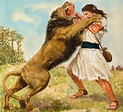Failure of Benjamin: Part 2 of 2 (series: Lessons on Judges)
by John Lowe
(Woodruff, S.C.)

General Notes
1 (Jg. 18:31) “And they set them up Micah’s graven image, which he made, all the time that the house of God was in Shiloh.” In addition to building a city of their own, the Danites set up a sanctuary and installed Jonathan, the son of Gershom as their priest. Also, Micah’s graven image was worshiped by them during the entire time that the house of God was in Shiloh, referring to the location of the tabernacle during the period of the judges. In other words, the Danites had their own private sanctuary and did not recognize the location of God’s true sanctuary at Shiloh.
2 (Jg. 18:28) “And there was no deliverer, because it was far from Zidon, and they had no business with any man; and it was in the valley that lieth by Bethrehob. And they built a city, and dwelt therein.” The fact that the author says it was called that unto this day indicates that the location bore the same name in the day, or time, of the author.
3 (Jg. 1:8) “Now the children of Judah had fought against Jerusalem, and had taken it, and smitten it with the edge of the sword, and set the city on fire.”
4 (Jg. 19:11) “And when they were by Jebus, the day was far spent; and the servant said unto his master, Come, I pray thee, and let us turn in into this city of the Jebusites, and lodge in it.”
5 (1 Chr. 12:29) “And of the children of Benjamin, the kindred of Saul, three thousand: for hitherto the greatest part of them had kept the ward of the house of Saul."
6 (Jg. 1.8) “Now the children of Judah had fought against Jerusalem, and had taken it, and smitten it with the edge of the sword, and set the city on fire.”
7 (2 Sam. 5.6) “And the king and his men went to Jerusalem unto the Jebusites, the inhabitants of the land: which spake unto David, saying, Except thou take away the blind and the lame, thou shalt not come in hither: thinking, David cannot come in hither.” The blind and the lame are mentioned because the defense was considered so effective that the city could be defended by cripples without need for strong soldiers.
8 (Ps. 48.2) “Beautiful for situation, the joy of the whole earth, is mount Zion, on the sides of the north, the city of the great King.”Beautiful for situation … is mount Zion (lit., beautiful for elevation). Rising aloft in beauty, the city of Jerusalem was remarkable topographically; for it was set on the summit of one of the numerous hills of Judaea. Early called the “Queen of the East,” Jerusalem is indeed the joy of the whole earth (cf. Lam 2:15). It was the unique claim of Jerusalem to be the city of the great King. There God is known, and in that city, the worship of Jehovah is centered.
9 (II Sam. 5:6–10) “6And the king and his men went to Jerusalem unto the Jebusites, the inhabitants of the land: which spake unto David, saying, Except thou take away the blind and the lame, thou shalt not come in hither: thinking, David cannot come in hither. 7Nevertheless David took the stronghold of Zion: the same is the city of David. 8And David said on that day, Whosoever getteth up to the gutter, and smiteth the Jebusites, and the lame and the blind, that are hated of David’s soul, he shall be chief and captain. Wherefore they said, The blind and the lame shall not come into the house. 9So David dwelt in the fort, and called it the city of David. And David built round about from Millo and inward. 10And David went on, and grew great, and the LORD God of hosts was with him.”The Jebusites. These were Canaanites still in possession of Jebus, or Jerusalem, at the time of David. They refused to surrender because of their superior fortification. The blind and the lame are mentioned because the defense was considered so effective that the city could be defended by cripples without need for strong soldiers. A better translation might be, “You will not come in here, but the blind and the lame will ward you off.” David was able to conquer Jerusalem, but he did it by discovering and attacking their weakest point, the gutter (Heb tsinōr). The meaning of this word was unknown until the early part of this century when Warren discovered a shaft forty feet deep connecting to a water tunnel that led outside the walls to a water supply used in siege. City of David was for a time the designation of this captured and strategic fortress of Jerusalem. From Millo and inward. Millo is not an English word, but simply a transliteration of a Hebrew word. The word means “the fill” and probably referred to a fill for defense purposes, like a huge casemate wall. The LORD God of hosts was with him. The writer is making the point that once God’s king was in power and God was helping him, he began to be accepted and successful as well as expand his kingdom.
No content on preachology.com may be printed or
copied to any other site without permission.
|
The Preaching Ezine Subscribe to my free newsletter for monthly sermons and get a free book right now. Just follow the link above and get the details! |
|
Sermon Supply Ministry
Be ready for Sunday…before Saturday night! |
|
Manna Seminary
Did you ever want to start or finish your Ministry Training? |
|
YOUR PAGES: by sharing YOUR great sermons! by sharing YOUR great poems! |



